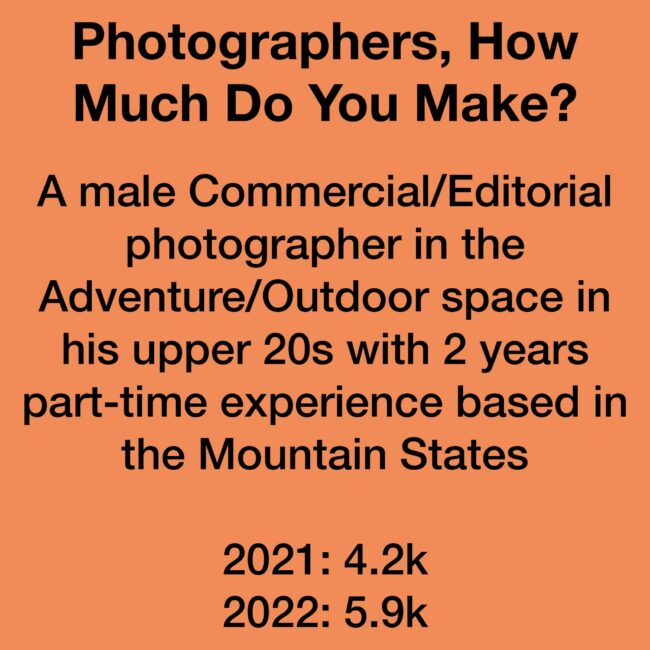I decided to turn a photo hobby into a professional endeavor in late 2020/early 2021. For the last two years, my goals have been to build out a professional-level portfolio, supplement my income to cover all photography-related expenses, and work with people that I can learn from.
I maintain a full-time, corporate job (40-60hrs/wk; earning over $100k), so my photo endeavors have to work around the constraints of that commitment.
I generate jobs through pitching potential clients on trips/activities that I have planned (or want to plan) (e.g., a fishing trip to Canada or hunting in Texas). My hit rate is admittedly pretty low, so I usually treat these trips as spec shoots that I later send to clients as my proof of concept/capabilities. I am very lucky to be able to juggle my job with these activities, as my job offers a relatively flexible leave policy and allows me to run a side business. Since I don’t rely on photography for all of my income, I have the luxury of being very choosy about what I shoot, who I shoot with, and who I work for. This has allowed me to take on long-term personal projects (including documentary film making), as well as paid work.
My financial goal on a yearly basis is to cover all photography-related expenses, which I did not accomplish in 2021, but (barely) accomplished in 2022.
My income is 90% Commercial, 10% Editorial.
Clients are US-based, national brands in the outdoor space (outdoor technical apparel, fishing, hunting).
I have low overhead. Yearly expenses are the usual suspects — cloud storage, website, etc. The last two years I have done one gear upgrade/year (lens, camera body, etc) in order to build out my professional kit. $3-4k/year.
Its hard to say how many days/year I work, since I am only part time. Since starting my business, I have averaged 7 days of *paid* shoots per year. If I add on spec shoots, that number grows to 30-40 days/year. Its worth noting that I view the majority of my spec shoots as leisure/fun (hiking, fishing, hunting, etc).
My income grew by 29% in the last year, but income remains low as I continue to shoot professionally in a part-time capacity.
My full time job is both key to my success, but also a major constraint. It benefits me because it allows me to step away from photo when I feel burned out (without losing income) and pays for spec shoots. However, it also constrains me because I’m unable to accept last minute jobs and I’m unable to take on as many projects as I’d like to.
Average job: two full days of shooting (morning and evening, with downtime during midday). Average day rate is 1500/day, based on licensing for 2 years, social and web. Expenses are also covered. Take home pay would be around $2-2.5k.
Best paying shoot to date was actually my third paid gig. I charged 1500/day for 3 days of shooting and received an additional 200/day for lodging/travel/meals. Since it was just me (no second shooter) and very low expenses, I pocketed $3700.
Worst paying shoot (besides the ones that were free) was my first ever paid gig: $400 for a 1-day shoot. No expenses covered. 9 hours of work. Client was local tourism board. Licensing was for all mediums in perpetuity. My take home pay was -$100.
I have recently taken up video through my work on short documentaries. I haven’t generated any income from video/films.
I have never viewed Instagram/Social Media as a viable tool for me. I don’t have the patience/time/interest to put into the platforms for the purposes of gaining followers/interactions. Instead, I focus my efforts on using those tools to network with other photographers and the marketing managers of brands that I’d like to work with. At the end of the day, I’ve found the most success with in-person events (trade shows, speaking panels, etc) where I can get face time with the right people.
Worst advice: Licensing doesn’t matter.
Best advice: You’re at a delicate place in photography. You have all the technical things figured out, but what makes your photo different from anyone else who was there with that gear that day? If you want to move forward and come away with photos that stir emotion, you need to answer the following: Why are you shooting this? Why do you want to photograph this? What makes your photographing this unique? The process of answering these will help you find your voice.
If you’re new to this, don’t feel the need to jump into this as a full time job. There are a lot of benefits to a slow burn, including finding your voice. My skill and portfolio has increased dramatically since I first started out… and to think that I was considering jumping into this full time two years ago is truly laughable. I was not ready, and if I had attempted to do so, I believe I would have lost my love for the art. Keep that love and passion alive.
